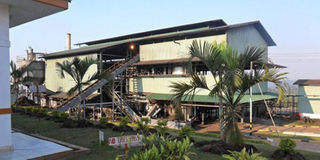New programme takes over palm oil growing in Uganda

Palm Oil Factory in Kalangala.
What you need to know:
- The districts set to benefit from Palm Oil growing include Buvuma, Mayuge, Masaka and Kyotera as government earmarks resources and land for the expansion of the project in Buikwe and Mukono districts.
The National Oil Palm Project has taken over the management, expansion and cultivation of Palm Oil growing across the country.
The Project takes over from the Vegetable Oil Development Project, which has been managing palm oil growing on Kalangala’s Main Island Bugala and the outlying islands of Bunyama and Bubembe.
The transformation comes after the International Fund for Agricultural Development – IFAD agreed with government through the Finance and Agriculture Ministries to support the extension of palm oil growing to several other districts in Uganda to the tune of $ 210 million (about Shs767 billion).
An agreement to this effect was signed between the government and IFAD at the IFAD headquarters in Rome – Italy in November 2019.
The districts set to benefit from Palm Oil growing include Buvuma, Mayuge, Masaka and Kyotera as government earmarks resources and land for the expansion of the project in Buikwe and Mukono districts.
Currently, work has kicked off in Buvuma on the establishment of Palm Oil gardens covering up to 3,500 hectares of land. Also, a private operator Buvuma – Oil Palm Uganda Limited is set to process crude oil from the Palm oil fruits in the area four years later. The company is a subsidiary of Oil Palm Uganda Limited and Bidco Uganda Limited. The government, on behalf of the people of Buvuma, will have a 10 per cent shareholding in the company.
Under the new project, a tripartite agreement has been signed by the farmers, Oil Palm Uganda Limited and the Local government authorities to streamline the mandate and activities to be carried out by the different parties in the business. Similar companies will be set up in Mayuge, and Masaka – Kyotera clusters once Palm Oil growing begins.
The government, through the Ministry of Agriculture, Animal Industry and Fisheries, has also established a National Oil Seed Project, which, according to Anthony Wanyoto, a communications officer under the National Oil Palm project will handle the expansion of the oil industry even in the Karamoja and Bunyoro sub-regions.
“This will basically handle issues to do with seeds and how to get better varieties that are resilient to climatic changes,” he said.
In a project document compiled by the International Fund for Agriculture Development, the Institution noted that the rationale for the development of Palm Oil Growing in Kalangala based on the Key results on the impact of Palm oil in the past decade, the projects would be viable for introduction to other areas to boost agricultural development.
“Prior to the project the major, though declining economic activity was fishing and food crops were mainly for subsistence or local markets. The introduction of the project through the Public-Private Producer Partnership through integrated producer initiative has benefited more than 1800 households,” reads part of the document.
Mr Vincent Ssempijja, the Agriculture, Animal Industry and Fisheries Minister says well as the emergence of the National Oil Palm Program and the introduction of Palm Oil growing in new districts will improve household incomes, many farmers where the crop is being introduced are still pessimistic about the crops that take long to yield fruits.
The introduction of the National Oil Palm Project has also led to a steady increase in the prices of Palm oil fruits from Shs468 a kilogram of the Palm Oil fruits in November 2019 to Shs533 in December and now to Shs608 in January 2020.
The Price of Palm oil fruits is computed according to a pricing formula depending on the quality of crude palm oil processed from the fruits in Kalangala, the Parity price of Palm oil fruits in Kuala Lumper, Malaysia and the cost of transportation from a mill in Kalangala to Jinja and the transportation of crude Palm oil from Malaysia to Uganda.
Mr Robert Migadde, the Buvuma Area Member of Parliament, says delays in the expansion of the project to his area had left many of his voters pessimistic on whether the project will be implemented in the area.




